INTRODUCTION
As the live event industry grows, it's no secret that safety and security is more and more heightened. And even though this may not be the sexiest part of the event world (or the most popular topic for a blog post), it's definitely one of the most important. So over the next year, I will continue to sit down with some of the most seasoned event security pros, to help share their expertise and advice.
My hope is that no matter whether you're in security operations or not, it can give all us a little more knowledge and perspective for the experiences we create.
LET’S SET THE SCENE
If you want to talk event safety, event security, crowd control or event chaos in general, Unified Command's Chad Ladov has to be at the table. One look at his resume and it basically reads: command center junkie: from Homeland Security, FEMA, the Oakland Coliseum (yes the RAIDERS), to pretty much every major music festival and arena in North America, this guy has seen it.
So for my conversation with Chad, I was really interested in understanding:
- How he got into this world in the first place.
- The key aspects of a successful command center.
- How he approaches crowd control and the impact technology can have.
- Why some events are still falling short, when it comes to security.
- His best advice for a career in events and more.
You ready to do this Chad?
Definitely. Thanks for having me.
Where did you grow up?
Pittsburgh, Pennsylvania.
So you're a Pirates fan?
Oh yeah baby. Growing up, my dad had shared season tickets, so we would go to a lot of games.
If your friends were a little tipsy now, how would they describe you?
Entertaining, funny, obnoxious, caring at times, an over-communicator. Mucus-y at times. Actually a lot of times. I'm constantly hacking up shit. So they're always grossed out.
I hear they call it the Coachella cough?
Among other things :)
If you were a headliner at a major festival, what would be on your rider?
I think the biggest thing for me, whether I'm a headliner, a patron or a staff member is quick, easy access. I love the convenience of a helicopter, police escort or Learjet. I don't care what color the walls are or whether there are only green M&Ms in my bowl. I would make sure that I'm getting in and out of these places as effortlessly as possible. That would be the keystone to my rider.
Only a learjet, a helocopter and a police escort?
Well... I'm a headliner baby and I'm too old to really care about that other shit.
How did you get started in the event security business?
My career defining moment was an internship with the Mayor of Denver. A few days on the job, the Broncos won the Super Bowl. My boss was so annoyed about having to produce the parade, he told me to go run the Super Bowl Parade. All of a sudden, I was in the middle of planning this massive parade for a million people.
Later, when I was working for the federal government, a lot of the best experiences were organizing big events around the president, FEMA Director and Secretary of Homeland Security. I loved those, and the rest is history.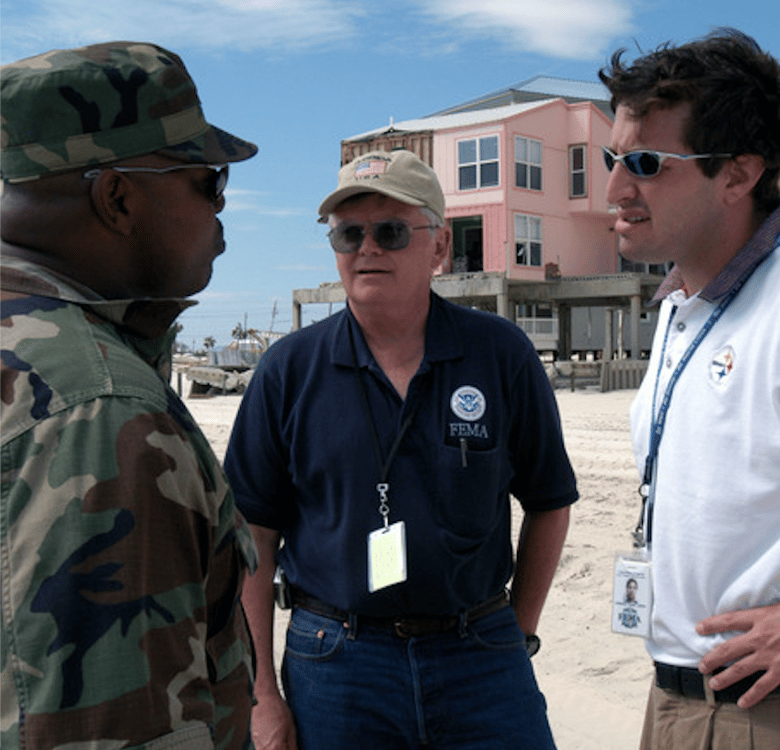
Chad (right) working with FEMA after Hurricane Ivan and reppin' the Steeler's Polo. Photo Cred: FEMA & Jocelyn Augustino
So, what aspects of your experience with FEMA and Homeland Security prepared you for a career in the event world?
I think the biggest aspect was the realization during my internship that I'm better when things are at their worst and really chaotic. I feel even more clear-headed in a crisis situation. I realized I was at my best when everyone was at their worst, especially with the Super Bowl Parade and working on scene at Columbine. The crazier things get, the more clear everything comes to me. That's what attracted me to FEMA and then ultimately to Homeland Security.
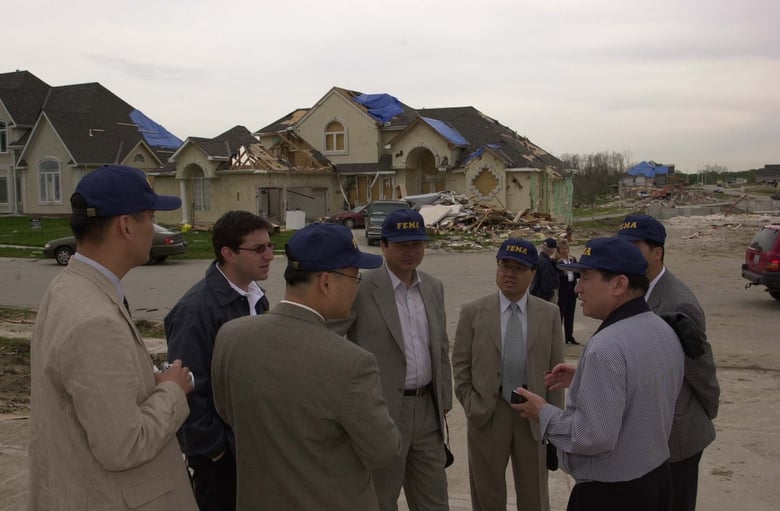
Chad (left) after a massive Tornado hits Missouri. Photo Cred: FEMA & Adam Dubrowa
You’ve worked on all types of events, from Coachella to the Olympics. Are there any big differences when it comes to event security in different industries?
The most concise way I can describe it is: there are basic standards that should be applied to every event. But every event is completely unique, so you have to start with a base level standard and find a way to make it a custom fit for that unique experience.
What are the typical crises teams are planning for in advance?
There are so many answers. What I tell people is that if you don't have a tremendous amount of money or time to dedicate to this process, work on your evacuation and shelter-in-place plans. Because at the end of the day, those are probably going to be the two options that you have for any extreme circumstance.
For example: An active shooter is really the most likely situation that all of us face outside of some basic weather disruption (if you're at an outdoor venue). In that case you're either going to flee, and therefore make sure everyone can get out safely, or you want to shelter everybody inside.
Weather is very much the same. If inclimate weather is coming, whether it's a hurricane, a tornado, an earthquake, a fire, lightning, rain, etc., you have to ask yourself, whether you have more resources than the patrons do to protect themselves? If that's the case, then you shelter them. If they're better off outside of your venue, then they're going to need to be evacuated and you work on an evacutation plan in advance. 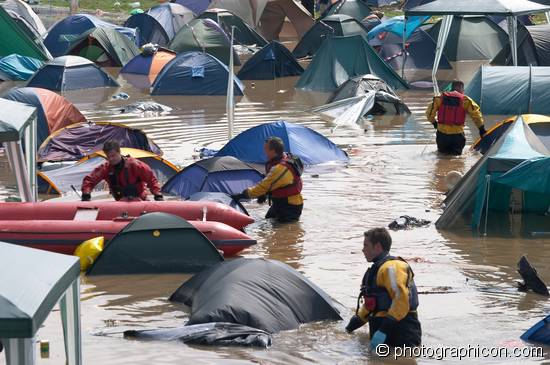
A little more rain than expected at Glastonbury Festival.
Whatever the disaster or emergency, it is the greatest possibility that it's going to be one of those two things. So a lot of the planning revolves around those scenarios.
With more and more festivals out there, what makes you the most nervous from a security standpoint?
Active shooters. There's so many deranged people. Just looking at the news every day there's rarely a day that goes by where there's not another active shooter situation somewhere in this country, where people have lost their lives. That finds its way to our doorsteps in the event world.
All of us in the music business, especially anyone that has any experience studying crowds, would be crazy to say that they can control a crowd. The power of a crowd is one of the most amazing things I've ever witnessed. The power of a mosh pit attempting to move in a direction and the waves of energy that can literally knock individuals down. I've literally seen individuals knocked down before anyone touched them by a shear wave of human energy. It sounds crazy, but that kinetic energy is real.
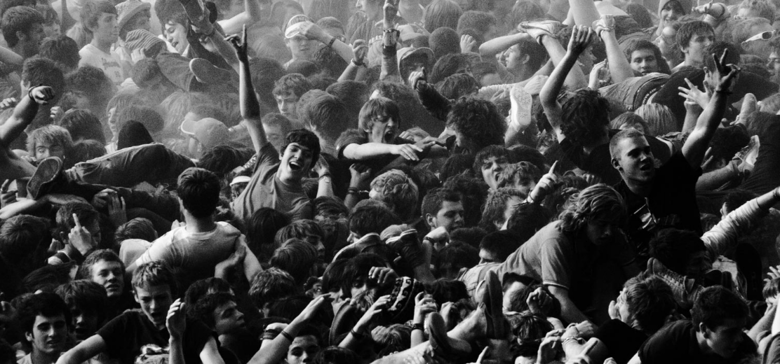
Pulled this one from Festival Sherpa's Most Brutal Mosh Pits at Music Festival Article: Absolutely Cray, Cray.
And here's a little extra: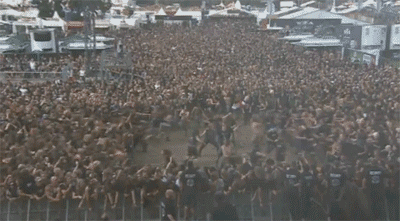
Mind Blooooown!
Speaking of crowd control, what would be the first few things that you would do in preparation for controlling the environment?
There are really three things that come to mind:
1: Identify the crew
I need to understand who am I working with. The festival director, site operations and production team is key. They're the ones that are going to dictate the flow.
2: Site logistics
I think number two right off the bat is site logistics. So, how many humans are you going to let into this space? Have you really crunched the numbers with the fire marshals? Is there room for everyone to go into a tent if they choose to? You have to figure out how to limit a massive crowd if only one tenth can go into a tent. And make sure that people can get in and out. A lot of it falls to site operations and logistical planning of the overall event.
If you put some hot new artist in a tent that only fits a tenth of your crowd, it’s a recipe for disaster. No security guy is going to be able to pull you back if shit goes wrong. It's an overall thought from the top down, from booking, to scheduling, to the architecture of the event, to the barricades. All of that is so critical in crowd control.
3: Technology
Technology can play a critical role. Cameras and overhead views are wonderful. I like to have spotters or cameras on the crowd and make adjustments as you start to see some of that crowd energy rise and fall. You get a feel for how you can prevent bottlenecks when you start to see a crowd butting up against each other and there’s no place to go.
So granular can these cameras get now?
Most of our cameras are 30x. So if you we have a camera on top of your highest stage, we will be able to read the year the quarter was made on the ground.
No way!
When you're setting up a command center for a big event, what would you identify as the most critical roles?
You know, it all starts from the top like anything else. I think you need someone that's really engaged and knowledgeable about the event and events in general. You need someone that's going to interact with everybody in and outside of the command center to make sure communication is going well and that it's flowing the way that it has been set up to flow.
You also need representatives from important groups like law enforcement, fire, medical, T-shirt security, guest services, internal operations and external operations.
Not a lot of organizations think this way. That has been my call to arms. That has been my mission statement now for close to 10 years, starting with what we did to rebuild the Raiders game day organization. I have tried to preach, teach and install the virtues of proper command and control for any large mass gathering. Too many folks feel that they actually need to be out there in the crowd, at the gate, or on the field, or by the stage. That’s just not the case. The command center is the best place you can be.
What can I do if I am a small to medium size event?
My pitch is the same for big and small events. If you can’t afford the cameras, staff and all the bells and whistles of these major events, that’s ok. But… if you have a few thousand patrons and you don’t put representatives from the different groups: Fire, EMS, Police, Private Security, etc. in one room together with the radios, phone and whatever else, to create some semblance of a central command, you’re not running a responsible event. If you don’t have some kind of central dispatch, to ensure seemless communication and coordination. If you’re not operating under the very basics of an incident command structure. Then shame on you.
How do you ensure quality communication among all of the different groups you work with?
I’ve got a list of things I go through, including:
- Site surveys
- Site visits and tours
- A review of maps, terminology and key areas
- An incident management and camera system
- A clear leadership structure and contact list
- A review of the patron guidebook and staff guide
Then we typically go around the room and have everyone talk a little bit about what they do. “I'm with security company A and we're responsible for all the exterior traffic positions, parking lots, and access control points.” That's usually a critical start. It’s amazing what half a day to a day of prep work and training can do with the people in the Command Center.
I absolutely think that it's important to take a break a few times during the day and ask everybody if there are any issues we need to address. And have that quick gathering to listen to the radio and check in.

How many cameras on average do you typically deploy at a large festival?
It really depends on the festival or event space and what you want to accomplish. I really like having cameras at the gates. I like to record searches and make sure that the experience is starting off the right way. We've found that the traffic cameras that we put up are super, super effective. Key traffic sections are large areas to cover. If you can get the shot callers in a room together and you can put up whatever it is, six to 16 cameras at different traffic points, it's a fucking game changer.
You can monitor crowd flow, crowd energy, and control the crowd as much as you can. The cameras are just brilliant for that.
What areas of the crowd control and event security is technology helping to advance?
I would say three things:
First: People are allowing events to track them with Bluetooth and GPS. That's really exciting for crowd control.
Second: I think RFID can be big for a number of reasons.
Three: Any kind of digital, laser or optical scanning of crowds, to give real counts in certain areas for future planning. Proper scheduling can allow for safer capacity of one area, especially with massive events with more than one stage.
Do you have any career advice for those working in the industry?
Pace yourself. Events can burn you out fast.
And what advice would you have for those wanting to get into the event world?
Don't get into it unless you love the work and not just because music, sports or entertainment are what you love.
If you had one goal for the festival industry when it comes to security, what would it be?
I'd want to get a real command center, with real authority and real technology at every live event with significant numbers. There needs to be a commitment of resources for this aspect of an event.
I'm glad you're up for the challenge brother.
You better believe it.
PREVIOUS DISCUSSIONS ON EVENT SECURITY:
Las Vegas Police Department (Events Division): Rick Nogues, Sergeant (READ)
Los Angeles Marathon: Murphy Reinschreiber, VP of Operations (READ)
BWG: Leo Nitzberg, Co-Founder (READ)
Rock N' Roll Marathon: Ted Metellus, Director of Course Operations (READ)
CHECK OUT OUR PREVIOUS INTERVIEWS:
Presidential Inauguration: Steve Kerrigan, Chief of Staff & CEO (READ)
HUKA Entertainment: Rachel Pucket, Digital Marketing and Social Media Manager (READ)
The Adventurists: Dan Wedgwood, Managing Director (READ)
Wasserman Media Group: Zack Sugarman, VP of Marketing & Digital Media (READ)
Electric Daisy Carnival: David Chen, Director of Technology (READ)
Firefly Music Festival: Christiane Pheil, Director of Programming (READ)
Charlotte Motor Speedway: Garrett Carter, Manager of Event Operations (READ)
RiSE Festival: Dan Hill, Co-Founder (READ)
Wanderlust: Heather Story, Senior Director of Event Operations (READ)
New York City Wine & Food Festival: John Trumble, Managing Director (READ)
KAABOO: Taylor Gustafson, Director of Ticketing & Credentials (READ)
KAABOO: Brian Wingerd, SVP of Marketing (READ)
Governors Ball Music Festival: Tom Russell, Co-Founder (READ)
Superfly (Bonnaroo & Outside Lands): Kat Tooley, Senior Director, Event Production (READ)
Firefly Music Festival: Megan Marshall, Assistant Director (READ)
Super Bowl & NFL Draft: Katie Keenan, NFL's Director of Event Operations (READ)
The Enthusiast Network: Scott Desiderio, VP of Event Ops (READ)
Sea Otter Classic: Frank Yohannan, Founder (READ)
Big Sur Marathon: Doug Thurston, Event Director (READ)
Summit Series: Cara Bubes, Event Director (READ)
Color Run: John Connors, VP of Experience (READ)
TechCrunch Disrupt: Leslie Hitchcock, Event Director (READ)
Boston Marathon: Matt West, VP of Operations (READ)
Academy Awards: Cheryl Cecchetto, Production Director (READ)
RunningUSA: Christine Bowen, Event Director (READ)
Charity Ball & Charity Water: Lauren Letta, Chief of Staff (READ)
Electric Run: Latane "Big Bird" Meade, Co-Founder (READ)
Color Run Australia: Luke Hannan, Event Director (READ)
WHAT IS LENND?
Lennd is an event management platform helping production teams streamline their logistics and operations. We're currently in a private beta with some of our favorite events around the globe, but you you're interested in a demo add email HERE./Screenshot%202017-01-13%2017.15.08.png?width=727&height=139&name=Screenshot%202017-01-13%2017.15.08.png)



